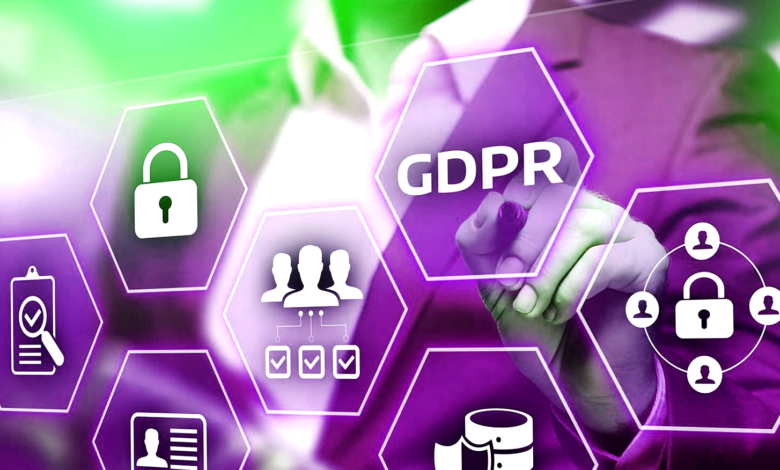7 Technologies to Help Your Business with GDPR Compliance

In the digital age, where data is a valuable asset, businesses must prioritize the protection of sensitive information. The General Data Protection Regulation (GDPR) stands as a crucial framework to ensure the privacy and security of individuals’ data. In this article, we’ll explore seven cutting-edge technologies that can assist your business in achieving GDPR compliance.
Technologies to Help Your Business with GDPR Compliance
Understanding GDPR Requirements
GDPR compliance begins with a solid understanding of its fundamental requirements. Data protection principles, the rights of data subjects, and specific obligations for businesses form the backbone of GDPR.
Read More : Voice-based Mobile Apps: Unlocking the Future of Mobile Interaction
Challenges in Achieving GDPR Compliance
Despite recognizing the importance of GDPR compliance, businesses often face challenges. The complexity of regulations, handling sensitive data, and keeping up with constant changes pose significant hurdles.
Role of Technology in GDPR Compliance
To address these challenges, businesses are turning to technology. Data encryption, access controls, and GDPR compliance software play pivotal roles in safeguarding sensitive information.
Technologies Facilitating Data Mapping
Efficient data mapping is essential for GDPR compliance. Data discovery tools and automated data mapping solutions simplify the process, ensuring comprehensive coverage.

Consent Management Platforms
Obtaining and managing consent is a key aspect of GDPR. Businesses can leverage consent management platforms to streamline the consent process and maintain compliance.
Data Breach Response Technology
In the unfortunate event of a data breach, immediate detection and response are critical. Utilizing notification and reporting tools can help businesses mitigate the impact and adhere to GDPR regulations.
Training and Awareness Tools
Ensuring employees are well-versed in GDPR requirements is essential. Employee training programs and awareness tools contribute to building a culture of compliance within the organization.
Automation for Continuous Compliance
Automating compliance checks and monitoring processes is a proactive approach. This not only saves time but also ensures continuous adherence to GDPR regulations.
Benefits of Implementing GDPR Technologies
The implementation of GDPR technologies brings numerous benefits, including enhanced data security, streamlined compliance processes, and the building of customer trust.
Case Studies: Successful Implementation Stories
Real-life examples of businesses successfully implementing GDPR technologies provide valuable insights. Learning from their experiences can guide others in their compliance journey.
Future Trends in GDPR Technology
As technology evolves, so do the tools for data protection. Exploring future trends in GDPR technology ensures businesses stay ahead, adapting to new challenges and opportunities.
Common Mistakes to Avoid
Navigating GDPR compliance can be tricky, with common pitfalls to avoid. Understanding these mistakes and implementing preventive measures is crucial for a seamless compliance journey.
Consulting Experts for GDPR Compliance
Seeking professional guidance is advisable. Choosing the right GDPR compliance consultant can provide businesses with the expertise needed to navigate the complexities of regulations.
Read More : What is the Role of Artificial Intelligence in Mobile App Development?
Conclusion
In conclusion, embracing technology is paramount for businesses aiming to achieve and maintain GDPR compliance. The benefits extend beyond legal requirements, contributing to enhanced data security and fostering customer trust.
Frequently Asked Questions (FAQs)
Q: Are these technologies suitable for businesses of all sizes?
- A: Yes, the discussed technologies can be tailored to suit the needs of businesses, irrespective of their size.
Q: How often should businesses update their GDPR compliance technologies?
- A: Regular updates are essential, considering the dynamic nature of data protection regulations and evolving cyber threats.
Q: Can automation fully replace manual efforts in GDPR compliance?
- A: While automation streamlines processes, human oversight remains crucial for nuanced decision-making and adaptability.
Q: What role do employees play in ensuring GDPR compliance?
- A: Employees are integral to compliance. Training and awareness ensure that everyone contributes to maintaining data security.
Q: Is it necessary to hire a GDPR compliance consultant, or can businesses handle it internally?
- A: While some businesses may handle compliance internally, hiring a consultant provides specialized knowledge and reduces risks.












One Comment